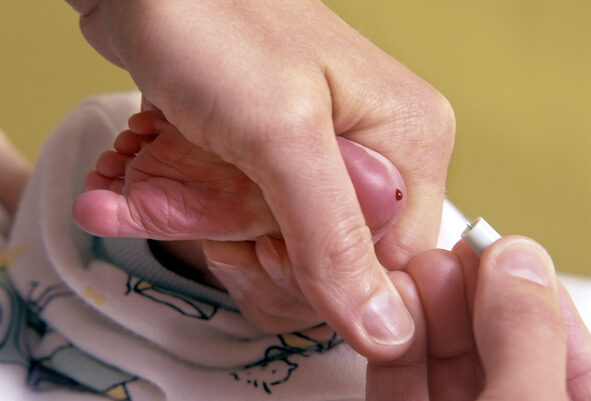Sometime in the first few days after your baby is born, one of their health care providers will take a few drops of blood from their heel, with a very small prick. This neonatal test includes screening for immune deficiencies, sickle cell anemia, cystic fibrosis, thyroid problems and metabolic challenges. It also screens for Phenylketonuria, or PKU.
PKU is a genetic disorder that can cause severe developmental delays if left untreated. At Alzein Pediatrics, we are here to provide immediate care and intervention, along with monitoring and guidance as your child grows, as there is no cure for PKU.
About one in every 10,000 to 15,000 children are affected by PKU here in the United States. PKU occurs when a particular gene fails to produce a particular enzyme. Without that enzyme, the amino acid phenylalanine builds up and becomes toxic, producing a range of intellectual disabilities and health issues.
The mutation that causes the gene to fail is an autosomal recessive trait, and so both parents must carry the mutation for a child to inherit PKU. But because the gene is recessive, most parents don’t know if they’re carriers or not. Testing at birth allows doctors to intervene to keep phenylalanine levels low, radically improving health outcomes for the very few children affected by PKU in the United States.
A specialized diet as well as recent advancements in drug treatments will help your child live comfortable with PKU. Current research advises a tailored diet based on an individual’s particular needs. In any case, the diet will aim to limit the amount of phenylketonurics—foods that introduce more phenylalanine into the body. People with PKU need to avoid high-protein foods like dairy products, meats, and beans as well as the artificial sweetener aspartame. Because humans need protein, the second component of a PKU diet involves supplemental nutrition since PKU patients cannot get the necessary range of nutrients from food sources alone.
It’s recommended that people who have PKU or have a family history of PKU begin a PKU diet before getting pregnant to reduce phenylalanine levels in the unborn child. Very few cases of PKU go undiagnosed, but infants with PKU who are not treated develop a musty odor in their breath or urine, or on their skin. They may experience seizures.
Your child will need regular bloodwork to monitor phenylalanine levels and to ensure their nutrition plan is working. Improving health outcomes for a child with PKU means keeping the levels of amino acid production and intake at the lowest possible levels.
PKU does not shorten life expectancy and, when promptly and properly treated, it does not affect intelligence or IQ.
Feeding a child with PKU can feel overwhelming upon diagnosis. Studies show breastfeeding a PKU baby is a very good choice; make an appointment with Kim Reule, certified Lactation Counselor and FNP if you have questions. Given the rarity of PKU, there are actually a variety of PKU cookbooks and resources to help with meal planning, substitutions, and sharing with your PKU child the tastes of all kinds of food. The podcast Cookbook Club is co-hosted by a PKU mom who regularly discusses the challenges of feeding a PKU child and the solutions she has found.
If you have questions about the heel prick test or are concerned that your child may have undiagnosed PKU, contact your Alzein Pediatric provider or call our office at 708-424-7600. Your Alzein Pediatrics team is here to support you and your child with PKU.


